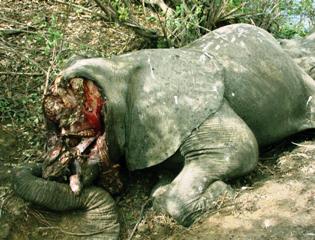African troops to fight Sudanese elephant poachers: WWF
March 27, 2013 (KHARTOUM) – Central African countries have agreed to deploy as many as 1,000 soldiers and law-enforcement officials as part of a joint military operation to protect the region’s last remaining elephant populations from a group of 300 poachers believed to be from Sudan, the World Wildlife Fund (WWF) said.

The Economic Community of Central African States (ECCAS) made the announcement at the conclusion of a three-day anti-poaching conference held in Cameroon’s capital, Yaoundé between 21-23 March.
The $2.33 million emergency plan calls for the use of aerial support, land vehicles, the purchase of satellite phones, the establishment of a joint military command including real-time information sharing and analysis systems, as well as sending a diplomatic mission to Sudan and South Sudan – where the poachers are believed to originate from.
Some 50 Arabic-speaking poachers carried out the latest mass killings of elephants, including 33 pregnant females and 15 calves, hacking off their tusks for sale in the illegal ivory trade, WWF said, citing local sources.
The incident occurred near Fianga, close to a cross-border national park area between Chad and Cameroon, where many elephants spend the dry season before the rains start in April.
According to information obtained by WWF, the massacre was carried out by the same group of poachers that in early 2012 travelled more than 1,000 km on horseback from northern Sudan across the Central African Republic (CAR) and Chad to kill over 300 elephants in the Bouba N’Djida National Park in northern Cameroon.
The group had reportedly decided to return earlier than usual this year in order to take advantage of the greater ground cover available during the rainy season and to catch park guards unawares.
The Sudanese poachers are also believed to be behind the killings of 23 elephants between 10 February and 1 March, which were discovered in Cameroon national park stripped of their tusks.
POPULATIONS DWINDLE
ECCAS states have agreed to fund the operations themselves, saying in a statement that the elephants “belong to the natural universal heritage of humanity”.
They also called on the international community to “mobilise and make available complementary funds” to sustain their efforts in the future.
According to WWF, the high demand for ivory coupled with porous borders and weak law enforcement capabilities continues to pose a serious threat to the survival of elephants in the region.
WWF says poachers have already wiped out elephants across large swaths of the CAR, with numbers plummeting from around 80,000 30 years ago to a mere few hundred today.
The ECCAS initiative has been welcomed by the US and EU, although both said its execution and implementation was key to combating the poaching threat long-term.
The Central African region has seen years of conflict and poor governance, with anti-poaching efforts previously rolled out in Chad yielding few results to date.
The issue has also been exacerbated by the ongoing Darfur conflict in western Sudan, with poachers on horseback crossing into Chad’s Zakouma national park, killing around 3,000 elephants in three years. At one point an average of three elephants a day were being slaughtered, The Guardian newspaper reported.
It says poaching gangs are thought to smuggle their valuable bounty to lucrative markets in China and Thailand via Sudanese and Nigerian ports.
(ST)
